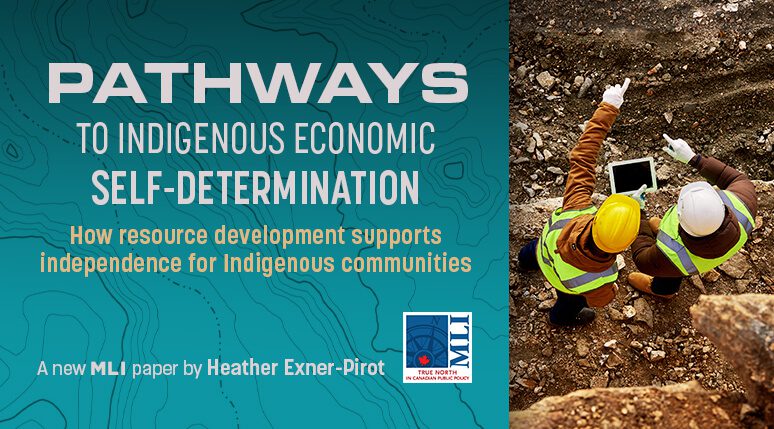OTTAWA, ON (May 26, 2021): Indigenous self-determination has been clearly articulated in the United Nations Declaration on the Rights of Indigenous Peoples (UNDRIP), which has been embraced by the federal government. But full self-determination isn’t possible without economic self-determination. And economic self-determination for many Indigenous peoples means engagement with a thriving resource sector.
This understanding has been missing in the debate over Ottawa’s proposed UNDRIP legislation, Bill C-15, according to MLI Fellow Heather Exner-Pirot. Bill C-15 risks impacting Indigenous rights to economic development and own-source revenue.
In MLI’s latest paper, titled “Pathways to Indigenous Economic Self-Determination,” Exner-Pirot explores how fully realized economic self-determination allows Indigenous communities to access the opportunities that non-Indigenous people already take for granted.
In contrast to the popular narrative that pits Indigenous peoples and the natural resource economy against each other, Exner-Pirot points to the reality that “Indigenous businesses are 40 times more likely than the average Canadian business to operate in the extractive sector.” The sector also provides the highest paying occupations for Indigenous people, including Indigenous women.
Indeed, the data is clear: overall, oil and gas occupations pay Indigenous employees about four times the average wage across all sectors. Exner-Pirot finds that the extractive sector also supports a wide range of other Indigenous businesses, creating sustainable revenue streams for individuals and communities alike.
Moreover, full Indigenous engagement in the natural resource economy is reversing some of the barriers imposed by colonialism. As Exner-Pirot writes, “the trend in recent years has evolved towards nations asserting themselves as partners, owners and shareholders. This is often the most consequential way through which they can achieve economic self-determination and real leverage in how projects proceed.”
“Self-determining nations need strong economies,” adds Exner-Pirot. “The resource sector offers the most viable economic opportunities for many First Nations, Inuit and Métis communities. Canada needs structures and systems that better facilitate Indigenous engagement.”
Exner-Pirot emphasizes that the federal government must allow for Indigenous nations that want to engage in the resource sector to do so more easily. With that in mind, the report recommends:
- Removing bureaucratic barriers for resource development in Indigenous territories that make it difficult for Indigenous communities and businesses to attract investment;
- Building the capacity of Indigenous nations to lead projects themselves;
- Improving access to financing to participate as equity stakeholders in projects; and
- Strengthening Indigenous economic rights and supporting the ability of Indigenous nations to say yes to development if they so choose.
“When Indigenous nations have the right tools to be full partners in resource development,” says Exner-Pirot, “timelines will be shorter, approval processes will be clearer, environmental practices will be more robust, and investor uncertainty will be mitigated, unleashing much greater potential in responsible resource development for the benefit of all.”
To learn more about how resource development supports independence for indigenous communities, click the button below.
***
Heather Exner-Pirot is a fellow at the Macdonald-Laurier Institute.
For more information, media are invited to contact:
Brett Byers
Communications and Digital Media Manager
613-482-8327 x105
brett.byers@macdonaldlaurier.ca






